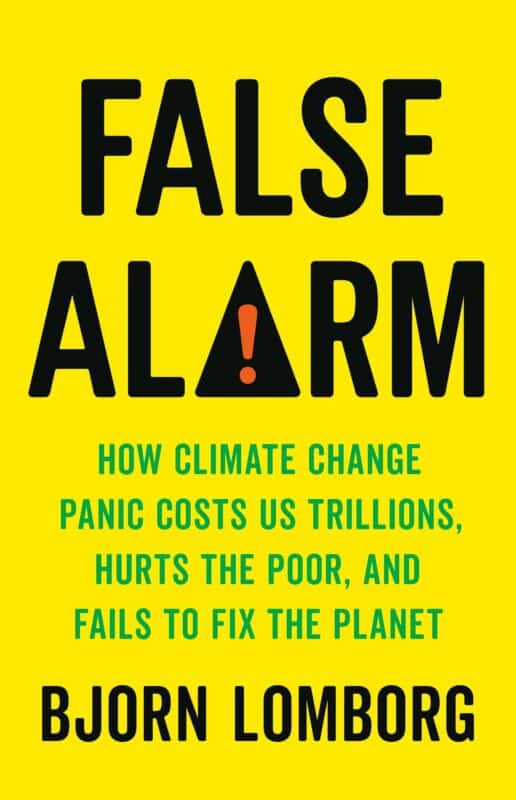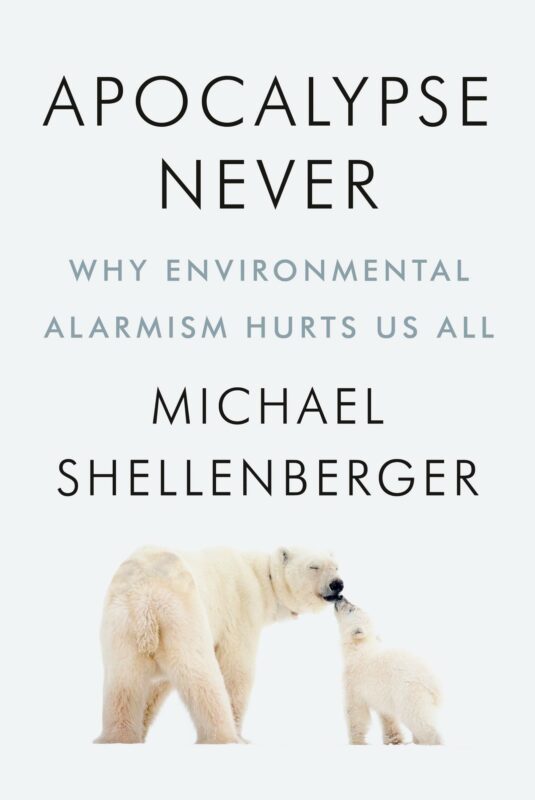Talking Past Each Other
Review of
Apocalypse Never: Why Environmental Alarmism Hurts Us All
New York, NY: HarperCollins, 2020, 432 pp.
False Alarm: How Climate Change Panic Costs Us Trillions, Hurts the Poor, and Fails to Fix the Planet
New York, NY: Basic Books, 2020, 320 pp.
Among the many mostly awful consequences of 2020’s COVID-19 pandemic, one should be regarded as a gift: the revelation of the degree to which we order our society around tomorrow being essentially the same as today. Most of us have never understood this fallacy and have never needed to, although the results of the 2016 election might have given us pause had we stopped to consider them. We’ve simply assumed the status quo was more or less permanent, and many of us have gotten away with it for our entire lives.
But the political chaos of Donald Trump’s election and the social devastation of the pandemic have presented the possibility of real change. As Trump demolished established norms of politics, Black Lives Matter activists have reminded us that some long-established conventions—such as structural racism—can and should be demolished; the pandemic has upended our notions of what the future could hold, possibly motivating an overdue reconsideration of efforts to confront a future of climate change. Policymakers’ current inability to move past incrementalism on an issue of planetary scale is absurd, even morally offensive. We simply can’t do what we’ve done for three decades and expect different results. A carbon tax won’t save the planet.
The “climate change debate” in the United States has devolved into sadly familiar patterns of dehumanization and retrenchment, covered by both the media and academia as two camps fighting over who is smart and reasonable and who is dumb and naive. Calling this soundbite ping-pong a debate is just as intellectually lazy as the arguments passing for policy proposals on Twitter. This is nothing new. Cognitive biases and motivated reasoning run the show on all sides of the “debate”: we’re all lawyers for our own causes. The inability to create emotional distance between ourselves and our tribal identities—which seem increasingly to consist entirely of either Team Red or Team Blue—raises the stakes with every new report from the Intergovernmental Panel on Climate Change. (For a much more eloquent and thorough exploration of this, do yourself a favor and read the columns by the former Vox writer David Roberts on tribal epistemology.)
To quote Strother Martin’s character in Cool Hand Luke, “What we’ve got here is failure to communicate.” On the left, leaders gain status by being an evidence gatekeeper, by creating a panel of experts and presenting the experts’ findings to The People. They “listen to the scientists” and “take climate change seriously.” The right has constructed its own knowledge-production machine, built on a distrust of those same experts and scientists, and fueled by often legitimate wariness about schemes to improve the human condition. These parallel institutions have few self-correction mechanisms, creating hermetically sealed worldviews that demarcate acceptable opinion and banish heterodox views.
These parallel institutions have few self-correction mechanisms, creating hermetically sealed worldviews that demarcate acceptable opinion and banish heterodox views.
This dichotomy was on full display in the final presidential debate of the 2020 election. For the first time during such a debate, the moderator, Kristen Welker, dedicated a whole section to each candidate’s climate policies or proposals. In a turn of events that shocked no one, Joe Biden emphasized the dangers of global warming and presented a few heavily vetted, policy-by-committee recommendations to curb pollution and transition the United States to renewable energy. Donald Trump, amid diatribes about tiny windows and malfunctioning wind turbines, expressed concern over the economic costs of moving the country away from fossil fuels and the potential harm to those who work in those industries. Elevating this to a “debate” suggests that they engaged with each other’s ideas, when in fact the candidates simply presented entirely different, incompatible worldviews and priorities. What happens when political parties and their constituents can’t agree on the scope and causes of, let alone remedies for, a crisis of this magnitude? To use language that feels perfectly appropriate during a global pandemic: can a democracy, and maybe even our civilization, survive when its inhabitants have radically different epistemologies?
Michael Shellenberger’s Apocalypse Never and Bjorn Lomborg’s False Alarm, both published earlier in 2020, attempt to explain and address this crisis of epistemology from the perspective of what I’m calling the “panic skeptic.” The panic skeptic has found a third option in the dualistic climate debate: that of a detached, “rational” observer who argues that the “real” threat to the planet is panic about climate change—more so than climate change itself.
Both authors head knowledge production and advocacy organizations (Environmental Progress and the Copenhagen Consensus Center, respectively). They both operate from the assertion that things really aren’t as bad as “environmental extremists” make it seem. They argue that the people panicking about climate are trying to sell you something.
Shellenberger and Lomborg both rightly emphasize that these climate activists have their own dogma (for example, that we have only 12 years left to solve climate change before humanity’s time on Earth is prematurely cut short). The authors are also correct to point out that climate change is only one of many existential threats facing the world in the twenty-first century—a fact that the pandemic has made even more abundantly clear. (Lomborg goes so far as to suggest that society should determine which threats get which resources through some cost-benefit schema by which we reduce each threat to how “bad” it is and how much it would cost to solve it. I find this idea patently absurd.) I also agree with them that it’s misleading and disingenuous to invoke “the poor” in climate policy debates without acknowledging that many, if not most, of the past decade’s international climate policies (such as actual and proposed carbon taxes) depend on a neoliberal free-market system that has helped immiserate millions in the first place.
The panic skeptic has found a third option in the dualistic climate debate: that of a detached, “rational” observer who argues that the “real” threat to the planet is panic about climate change—more so than climate change itself.
Panic skeptics such as Shellenberger and Lomborg build their arguments on the rationality of scientific inquiry. Instead of presenting new or controversial findings, they claim a more impartial, rational interpretation of the same facts climate extremists build their arguments around. Stop making such a fuss, they say. And then they do precisely what the climate extremists they rail against do: use the mantle of purportedly disinterested science to support their political aims. For Shellenberger, this involves a crusade to move the whole species to a reliance on zero-emissions nuclear energy. For Lomborg, it’s a kind of utilitarianism that downplays the climate problem in an effort to increase global prosperity.
Both authors claim to have the cure to what ails climate discourse. They both seek to engage with what they perceive as conservative priorities. Lomborg, who has the easier task of dealing with conservatives outside the United States who acknowledge that anthropogenic climate change is a real thing, has a whole section of cost-benefit-analyzed policies to combat global warming—and global poverty while we’re at it. These include carbon taxes, green research and development, solar geoengineering research, and “making people richer” through various international aid and economic growth mechanisms. As if you could reduce the wicked problem of unequal and disproportionate burdens of climate change and climate “solutions” to a simple tabulation of profits and losses!
Instead of presenting new or controversial findings, they claim a more impartial, rational interpretation of the same facts climate extremists build their arguments around. Stop making such a fuss, they say.
Unsurprisingly, Lomborg sidesteps the issues of how to quantify the “appropriate” price for carbon for taxation purposes, and who ought to make such a determination. He elides the best way to structure and carry out these green R&D projects. If you can get past the white-savior overtones of his international aid arguments, you see very little original contribution to the debate about the role that international aid plays in the economies of developing countries. This is not to say that these are bad ideas; they just don’t go very far. Lomborg’s role is not to provide detailed proposals, but rather to highlight the many ways he would prefer policymakers make the world a better place for more people. In his view, climate alarmism not only clouds the issue but makes these other efforts less visible and less successful.
In stark contrast to Lomborg’s purposefully matter-of-fact, detached tone in False Alarm, Shellenberger argues passionately in Apocalypse Never that “the conversation about climate change and the environment has spiraled out of control.” He makes a moral, rather than an economic, case for promoting human well-being against what he calls the “anti-humanism” of apocalyptic environmentalism. Like Lomborg (but in a higher register) he cites as evidence climate policies that, whether by accident or design, limit economic development in poor countries—actively making worse the lives of people who always seem to get shortchanged and overlooked. He unsurprisingly spends a considerable number of pages advocating for his light-on-the-details global nuclear agenda, the main advocacy goal of his foundation.
Shellenberger pairs this agenda with environmental “good news” to combat climate alarmism. He argues that journalism is much to blame for all the doom and gloom dominating the climate discourse, and he’s right that humanity has made some progress on dealing with climate. But the way he touts these successes downplays the moral and logistical complexities of the systems that brought them about. Shellenberger tries to make a greatest-hits list of climate issues and gives us his hot takes: he covers plastics, livestock production, and deforestation, but barely even mentions artificial meat substitutes, biofuels, precision agriculture, decarbonization, and electric vehicles, to name a scant few. Apocalypse Never suffers from its pedantic tone and stale structure, and it’s hard to stomach all the self-aggrandizement: “I published two long articles criticizing climate alarmism,” he writes as one instance. “Both articles were widely read, and I made sure the scientists and activists saw my article. Not a single person requested a correction. Instead, I received many emails from scientists and activists alike, thanking me for clarifying the science.”
Shellenberger’s book suffers from its pedantic tone and stale structure, and it’s hard to stomach all the self-aggrandizement.
Despite their many drawbacks, both Apocalypse Never and False Alarm do a service by shining a light on the unhelpfully extremist tone adopted by many climate change activists, journalists, and academics. Shellenberger and Lomborg remind us that it doesn’t have to be this way when it comes to talking about climate change. Our polarization is a product of our discourse, cognitive biases, tribalism, and profoundly entrenched politics. But overcoming the seeming intractability of formulating an appropriate response to climate change isn’t a matter of doubling down on fear tactics, building a stronger case with scientific facts and evidence, or gaslighting people that their panic is unfounded and making the problem worse.
I mentioned earlier that one benefit the pandemic has provided is destroying our illusion that the future will necessarily look like the past. This should prompt fresh thinking about how to deal with our many inherited and ongoing problems, to envision a brighter and more hopeful future. But there’s another positive lesson to be found amid the wreckage of 2020: with the end of the pandemic in sight, humans and our institutions are capable of confronting and overcoming enormous challenges. The climate crisis, which we’ve seen coming for a long time, could prove to be another of those challenges.


